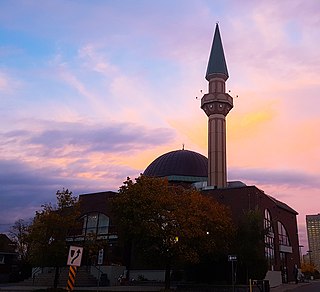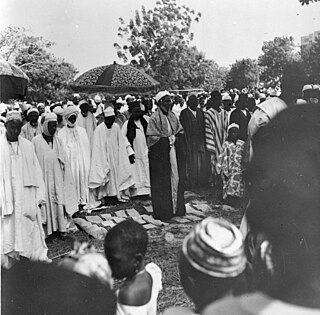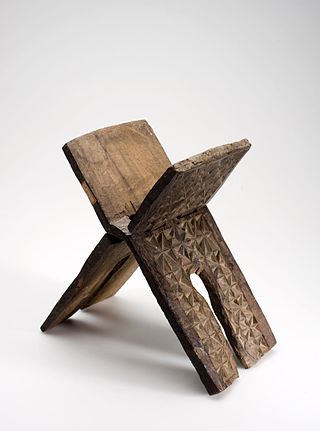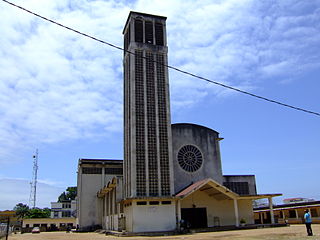
Islam is a minority religion in Canada, practised by approximately 4.9% of the population. Canadian Muslims are one of the most ethnically diverse religious groups across the country. Muslims have lived in Canada since 1871 and the first mosque was established in 1938. Most Canadian Muslims are Sunni, while a significant minority are Shia and Ahmadiyya.

Islam is the third-largest religion in the United States (1.34%) after Christianity (67%) and Judaism (2.4%). The 2020 United States Religion Census estimates that there are about 4,453,908 Muslim Americans of all ages living in the United States in 2020, making up 1.34% of the total U.S. population. In 2017, twenty states, mostly in the South and Midwest, reported Islam to be the largest non-Christian religion.

Brazil is a predominantly Christian country with Islam being a minority religion, first brought by African slaves and then by Lebanese and Syrian immigrants. Due to the secular nature of Brazil's constitution, Muslims are free to proselytize and build places of worship in the country. However, Islam isn't independently included in charts and graphics representing religions in Brazil due to its very small size, being grouped in "other religions", which generally represent about 1% of the country's population. The number of Muslims in Brazil, according to the 2010 census, was 35,207 out of a population of approximately 191 million people. This corresponds to 0.018% of the Brazilian population.

Islam was the first Abrahamic religion to arrive in Ghana. Today, it is the second most widely professed religion in the country behind Christianity. Its presence in Ghana dates back to the 10th century. According to the Ghana Statistical Service's Population and Housing census (2021), the percentage of Muslims in Ghana is about 19.9%.

Islam is the official state religion in Tunisia. According to the United States CIA, 99.1% of its adherents are Sunni Muslims. The constitution of Tunisia states that the country's “religion is Islam”, the government is the “guardian of religion”, and requires that the president be Muslim. The predominant madhhab in the country is the Maliki school. The Tunisian island of Djerba is home to a population of Ibadi Muslims.

Islam in Greece is represented by two distinct communities; Muslims that have lived in Greece since the times of the Ottoman Empire and Muslim immigrants that began arriving in the last quarter of the 20th century, mainly in Athens and Thessaloniki. Today, Muslims in Greece are mainly immigrants from West Asia, other Balkan regions, South Asia, and North Africa.

Argentina is a predominantly Christian country, with Islam being a minority religion. Due to secular nature of the Argentine constitution, Muslims are free to proselytize and build places of worship in the country.

Islam in Haiti consists of a small minority of Muslims forming less than 1% of the total population, composed of locals and foreign immigrants. A number of mosques and Islamic organizations are present in the country.

Barbados is an overwhelmingly Christian majority country, with Islam being a minority religion. Due to secular nature of the country's constitution, Muslims are free to proselytize and build places of worship in the country. Statistics for Islam in Barbados estimate a Muslim population of over 4000, most of whom are immigrants or descendants of immigrants from the Indian state of Gujarat. A few immigrants from Guyana, Trinidad, South Asia, and the Middle East, as well as about 200 native-born persons, constitute the rest of the growing Muslim community, representing 1.50 percent of the population Close to 90 percent of all Barbadians are of African descent (Afro-Bajans), mostly descendants of the slave labourers on the sugar plantations. The remainder of the population includes groups of Europeans (Euro-Bajans), Asians, Bajan Hindus and Muslims, and an influential Middle Eastern (Arab-Bajans) group mainly of Syrian and Lebanese descent.

Finland is Christian majority country, with Islam being a minority faith. The constitution of Finland ensures freedom of religion and Muslims are free to proselytize and build places of worship in the country.

Islam in Africa is the continent's second most widely professed faith behind Christianity. Africa was the first continent into which Islam spread from the Middle East, during the early 7th century CE. Almost one-third of the world's Muslim population resides in Africa. Muslims crossed current Djibouti and Somalia to seek refuge in present-day Eritrea and Ethiopia during the Hijrah ("Migration") to the Christian Kingdom of Aksum. Like the vast majority (90%) of Muslims in the world, most Muslims in Africa are also Sunni Muslims; the complexity of Islam in Africa is revealed in the various schools of thought, traditions, and voices in many African countries. Many African ethnicities, mostly in the northern half of the continent, consider Islam as their traditional religion. The practice of Islam on the continent is not static and is constantly being reshaped by prevalent social, economic, and political conditions. Generally Islam in Africa often adapted to African cultural contexts and belief systems forming Africa's own orthodoxies.

Gabon is a Christian majority nation, with around ten percent of the population being Muslim according to 2020 figures. Almost all of them follow Sunni Islam. Due to the secular nature of the country's constitution, Muslims are free to proselytize and build places of worship in the country.

Christianity is the most widely professed religion in the Dominican Republic. Historically, Catholicism dominated the religious practices of the country, and as the official religion of the state it receives financial support from the government. About 60% of Dominicans identify themselves as Catholic.

Islam is a minority religion within the Democratic Republic of the Congo, where the large majority of the population is affiliated with various Christian denominations and sects. It was first introduced to the Congo basin from the East African coast during the 19th century and remains largely concentrated in parts of Eastern Congo, notably in Maniema Province. Most Congolese Muslims are Sunni and follow the Shafi‘i and Maliki schools of jurisprudence (fiqh). Though estimates vary, it is generally believed that between one and 10 percent of the country's population identify as Muslim.
The Constitution provides for freedom of religion, but the government imposes onerous criteria on religious groups for official recognition, which is required for the legal construction of houses of worship. There is no registered muslim groups in Angola.

Christianity is the predominant religion in the Republic of the Congo, with Catholicism being its largest denomination.

The Republic of the Congo, also known as Congo-Brazzaville, the Congo Republic or simply either Congo or the Congo, is a country located on the western coast of Central Africa to the west of the Congo River. It is bordered to the west by Gabon, to the northwest by Cameroon, to the northeast by the Central African Republic, to the southeast by the Democratic Republic of the Congo, to the south by the Angolan exclave of Cabinda, and to the southwest by the Atlantic Ocean.

Islam in the Americas is a minority religion in all of the countries and territories of the Americas. Approximately 1% of North America population are Muslims, and 0.1% of Latin America and Caribbean population are Muslims.
Religion and beliefs occupy an important place in the daily life of the nation of Senegal. The majority of citizens follow Islam. In 2013, 6% of the population followed indigenous beliefs, while 2% followed Christianity.

Islam is the third most widely professed religion in New York City, after Christianity and Judaism. A 2018 study estimated that there are over 750,000 Muslims living in New York City, the largest population of Muslims by city in the United States. Approximately 9% of New York City residents are Muslim, constituting 22.3% of American Muslims, with 1.5 million Muslims in the greater New York metropolitan area, representing the largest metropolitan Muslim population in the Americas.—and the most ethnically diverse Muslim population of any city in the world.












